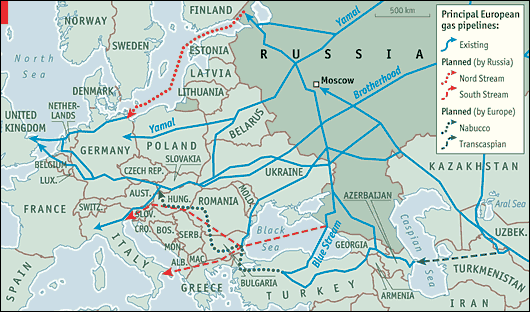Eastern Europe, America and Russia:Pipedreams
(東欧、アメリカ、ロシア:夢のパイプライン)
Economist:Jan 24th 2008 | VILNIUS
(東欧、アメリカ、ロシア:夢のパイプライン)
Economist:Jan 24th 2008 | VILNIUS
America seems to care more than the European Union about eastern Europe
アメリカはEUよりも東欧が気になるらしい
EUROPEANS may not always like it, but America still matters most for their security. As Kosovo edges towards independence, NATO ponders further expansion and Russia rips Europe's threadbare energy policy to rags, every debate involves America. And the mood is gloomy.
ヨーロッパ勢は気に入らないかもしれないが、アメリカは自分達の安全保障にとってやっぱり一番大事なんである。
コソボが独立へ向けてにじり寄るわ、NATOは更なる拡大へ向けてああでもないこうでもないと考えているわ、ロシアはヨーロッパのお粗末なエネルギー政策を木っ端微塵にするわ…。
そんな中、アメリカはどの議論にも絡んでいるのだ。
しかも状況は暗い。
“Russia is getting stronger; we are getting weaker”, concludes one European political leader. That is alarmingly clear in Serbia, where a pro-Russian nationalist, Tomislav Nikolic, came out ahead in the first round of the presidential election on January 20th. Serbia has just signed an energy pact to distribute Russian gas exports to Europe; in return a Russian company (the oil arm of Gazprom, the state-run gas giant) is to get a controlling share in Serbia's national oil monopoly.
「ロシアが強くなってきている。ボクらは弱くなってきてる」と某ヨーロッパの政治指導者が結論を出した。
1月20日の大統領選挙第一ラウンドで、親ロシアのナショナリスト、トミスラヴ・ニコリッチが勝利したセルビアでは、これはやばいくらいに明々白々だ。
セルビアはロシア産ガスをヨーロッパ向けに輸出するエネルギー条約に調印したところだ。
その見返りに、ロシア企業(国営巨大ガス企業ガスプロムの石油部門ね)は、セルビアの国営石油独占会社の株式の過半数を買う予定だ。
Europeans flinch at the idea of Kosovo, the mostly ethnic-Albanian province of Serbia, declaring independence immediately—something the Russians strongly oppose. The Americans fear that more delay risks violence by impatient Kosovars or by Serb provocateurs. Some Europeans plead for a few weeks longer, perhaps to allow yet more talks with Serbia after its presidential election, or simply to get more European waverers such as Spain and Romania to back European Union recognition of an independent Kosovo.
ヨーロッパ勢は、殆どがエスニック・アルバニア人の州であるコソボが即時独立宣言する、という考えに尻込みしている。
これはロシアが強烈に反対していることだ。
アメリカ勢は、これ以上遅らせれば、短気なコソボ人またはセルビアの工作員が暴動を起こすリスクが増える、と心配している。
恐らく大統領選挙後にもう少しセルビア側との協議させようと、または単純に、スペインやルーマニアといった、EUのコソボ独立承認支持棄権国を増やそうとして、2-3週間伸ばしてくれと嘆願するヨーロッパ勢もいる。
Serbia is one of what some analysts call “swing states”, places where Russia and the West are vying for influence. Others include Ukraine, Georgia, Azerbaijan and Moldova—and even a few EU members such as Latvia and Bulgaria. President Vladimir Putin of Russia, accompanied by his likely successor, Dmitry Medvedev, recently signed a deal with Bulgaria to build a new pipeline across the Black Sea. Called South Stream, this will pipe Russian gas direct to Europe, bypassing transit countries such as Ukraine and Poland. In this, it matches Nord Stream, a similar bypass under the Baltic (see map).
セルビアは、一部のアナリストが「スイング国家」と呼ぶものの一つだ。
要するに、ロシアと西側が影響力を争っている場所、ということだ。
他にはウクライナ、グルジア、アゼルバイジャン、そしてモルドバなんかがある。
それにラトヴィアやブルガリアといったEU加盟国だってそうだ。
ロシアのウラジミール・プーチン大統領は先日、次期大統領最有力候補ディミートリ・メドヴェージェフを伴って、ブルガリアと黒海を渡る新パイプライン建設協定を結んだ。
いわゆるサウス・ストリームである。
ウクライナやポーランドといったトランジット国を迂回して、ロシア産ガスを直接ヨーロッパへ届けるパイプラインだ。
同じようにバルト海の海底を通るノード・ストリームに匹敵する(地図参照)。
South Stream may stymie a rival EU effort, Nabucco, which was meant to bring gas from the Caspian and Central Asia to western Europe through the Balkans. Nabucco would be the only pipeline from the region not to cross Russian territory, giving Europe the hope of more diversified gas supplies. Nabucco's prospects already looked shaky: gas for it must come from either a trans-Caspian pipeline (which Russia has blocked) or Iran (which America dislikes). If South Stream were built, it would make Nabucco uneconomic.
サウス・ストリームは、カスピ海や中央アジアからバルカン半島を通って西ヨーロッパにガスを輸送するはずだった、ヨーロッパの競合、ナブッコ・パイプラインを窮地に陥れるかもしれない。
ナブッコはこの地域からロシア領土を横切らない、ヨーロッパにガス供給をより多様化する望みを与える、唯一のパイプラインとなるだろう。
その可能性は既に怪しくなってしまった。
そのためのガスはカスピ海を渡るパイプライン(ロシアが阻止している)からか、さもなければイランから来なくてはならないのだ(これはアメリカが嫌がる)。
サウス・ストリームが出来てしまえば、ナブッコは無駄になるだろう。
Pipelines and dependence on Russian gas are not the only sources of controversy. American and European diplomats are also wrestling with the question of NATO expansion, which may feature at the alliance's summit in Bucharest in April. The leading candidate is Croatia. Albania and Macedonia are less prepared, but bringing them in might be seen as one way of countering instability caused by Serbia's hostility to Kosovo's independence.
問題の原因は、パイプラインとロシア産ガスへの依存だけではない。
アメリカとヨーロッパの外交官等は、4月にブカレストで開催されるNATOサミットでも上げられるかもしれない、NATO拡大の問題でも格闘している。
主要候補国はクロアチアだ。
アルバニアとマケドニアはまだまだ準備不足だ。
しかしこれらの国々を引っ張り込むことは、コソボ独立に対するセルビアの敵対行為によって生じる可能性のある不安定さへの、一つの対策と考えられるかもしれない。
That leaves Ukraine, whose new government says it wants eventually to join NATO, and Georgia, which tarnished its democratic credentials in a crackdown on opposition protests in November. Offering either country a membership action plan—a staging post to joining the alliance—would enrage Russia. But holding back might be seen as giving the Kremlin a veto over its neighbours' security arrangements. The hunt is on for something else to offer instead.
残るはウクライナだ。
同国の新政府は最終的にはNATOに加盟したいと言っているし、11月に反政府デモの弾圧で民主主義の信頼性を汚してしまったグルジアもある。
どちらかの国に加盟行動計画(加盟への中継地点)を提案することは、ロシアを激怒させるだろう。
だが、それをやらないことは、ロシア政府に近隣諸国の安全保障に関して拒否権を与えるもの、と見なされるかもしれない。
代わりの貢物は既に模索されている。
Largely silent is the EU, whose members appear more concerned over institutional reform and emissions targets (see article) than geopolitical issues. That worries the Americans. They seem to have settled a row with Poland over a planned missile-defence base. But not much else is going right. Ron Asmus, a former American diplomat now at the German Marshall Fund, a think-tank, frets publicly about a “rollback” of the West's influence in eastern Europe. He is not the only one.
ほとんど沈黙しているのがEUだ。
加盟国は制度改革と排出目標の方が、地政学的問題よりもご心配のようである。
これがアメリカ人を不安にさせる。
彼らはポーランドとの、ミサイル防衛基地計画を巡る小競り合いはおさめたらしい。
が、その他はほとんど上手くいっていない。
元アメリカ外交官で現在はドイツのマーシャル・ファンドに勤務するRon Asmusは、西側の東欧における影響力の「衰退」については、大っぴらに騒ぎ立てている。
彼だけじゃないよ。
 | KGBの世界都市ガイド晶文社このアイテムの詳細を見る |




















